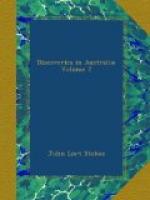CHURCH AT DOBBO.
As soon as the rain cleared off, our visitors landed, and Mr. Earl and myself soon followed them to their village, where they were all drawn up to receive us, and saluted us with one musket. We were conducted to the village in state, and immediately taken to see the church, which had been a nice building, capable of holding all the inhabitants of the place; but it had latterly been allowed to get very much out of repair. In the font they had placed a saucer containing a small coin, as a hint that we should contribute something towards the restoration of the church, which was not thrown away, and most probably led to the largest donation the church had received for some time. After inspecting the church and village, we walked for some distance along the beach, and saw a great many parrots, parakeets, and large wood-pigeons, of varied and beautiful plumage, flying amongst the splendid kanari* trees, which, from all accounts, afford most valuable timber for ship-building.
(Footnote. Cannarium commune.)
June 23.
Mr. Earl and myself visited the village of Dobbo. We found it very little changed since our last visit. The trading vessels had all sailed, but the village was occupied by a few Dutch traders from Macassar, some dozen Chinese, and about 300 Bughis and Macassars; the greater portion of whom were preparing to visit the eastern side of the group to collect the produce for the vessels expected to arrive at the setting-in of the westerly monsoon.
The only sea-going vessels in the harbour were two large Macassar proas and a Ceramese junk; which were to sail in a few days.
Whilst I was employed, making astronomical observations to determine the position of the point, Mr. Earl obtained considerable information from the traders.
TRADE OF THE ARROU ISLANDS.
The commerce of these islands appears to have increased considerably of late years, four or five ships and brigs, with a number of Macassar and Bughis proas, whose united crews were said to have amounted to 5,000 persons, having sailed with cargoes about two months previous to our visit.
The produce of the Arrou Islands consists chiefly of pearls, mother-of-pearl shell, tortoise-shell, birds of paradise, and Trepang; but the trade of Dobbo is not dependent on the productions of the Arrou Islands alone. The Bughis proas import large quantities of British calico, iron, hardware, muskets, gunpowder, etc. from Singapore, to obtain which Dobbo is visited by the natives of Ceram, Buru, New Guinea, and of all the adjacent islands, it being the only spot in this part of the world where British manufactures can at present be procured. The articles brought for sale from New Guinea consist of nutmegs, tortoise and mother-of-pearl shell, ambergris, birds-of-paradise, ebony, clove, and Massay bark, rosamala (an odoriferous wood) and Kayu-buku, a wood much prized for cabinet-work. British calicoes and iron are the principal articles taken in exchange for these by the proas from New Guinea.




